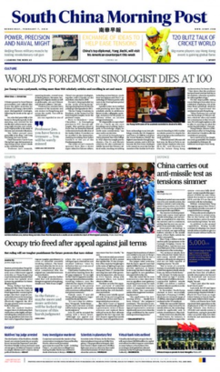 SCMP front page on 7 February 2018 | |
| Type | Daily newspaper |
|---|---|
| Format | Broadsheet |
| Owner(s) | Alibaba Group |
| Founder(s) |
|
| Publisher | SCMP Publishers |
| President | Catherine So, CEO |
| Editor-in-chief | Tammy Tam |
| Managing editor | Eugene Tang, Yonden Lhatoo |
| Opinion editor | Robert Haddow |
| Sports editor | Joshua Ball (acting) |
| Photo editor | Robert Ng |
| Executive Editor | Chow Chung-yan |
| Founded | 6 November 1903 (44,200 issues) |
| Headquarters | Global: Morning Post Centre 22 Dai Fat Street Tai Po Industrial Estate Tai Po, New Territories Hong Kong Overseas: 56 Mott Street New York, NY 10013 U.S. |
| Circulation |
|
| ISSN | 1021-6731 (print) 1563-9371 (web) |
| OCLC number | 648902513 |
| Website | www |
| South China Morning Post | |||||||||||||
|---|---|---|---|---|---|---|---|---|---|---|---|---|---|
| Traditional Chinese | 南華早報 | ||||||||||||
| Simplified Chinese | 南华早报 | ||||||||||||
| |||||||||||||
The South China Morning Post (SCMP), with its Sunday edition, the Sunday Morning Post, is a Hong Kong-based English-language newspaper owned by Alibaba Group.[2][3] Founded in 1903 by Tse Tsan-tai and Alfred Cunningham, it has remained Hong Kong's newspaper of record since British colonial rule.[4][5]: 251 Editor-in-chief Tammy Tam succeeded Wang Xiangwei in 2016. The SCMP prints paper editions in Hong Kong and operates an online news website that is blocked in mainland China.
The newspaper's circulation has been relatively stable for years—the average daily circulation stood at 100,000 in 2016. In a 2019 survey by the Chinese University of Hong Kong, the SCMP was regarded relatively as the most credible paid newspaper in Hong Kong.[6]
The SCMP was owned by Rupert Murdoch's News Corporation from 1986 until it was acquired by Malaysian real estate tycoon Robert Kuok in 1993.[3] On 5 April 2016, Alibaba Group acquired the media properties of the SCMP Group, including the SCMP.[2][7] In January 2017, former Digg CEO Gary Liu became the SCMP's chief executive officer.[8]
Since the change of ownership in 2016, concerns have been raised about the paper's editorial independence and self-censorship. Critics including The New York Times, Der Spiegel, and The Atlantic have alleged that the paper is on a mission to promote China's soft power abroad.[9][10]
- ^ "South China Morning Post Advertising & Marketing Solutions, About SCMP". advertising.scmp.com. 17 February 2017. Archived from the original on 29 May 2019. Retrieved 29 May 2019.
- ^ a b Lhatoo, Yonden (5 April 2016). "Paywall down as Alibaba takes ownership of SCMP". SCMP.com. Archived from the original on 5 April 2016. Retrieved 5 April 2016.
- ^ a b "Alibaba Buys HK's SCMP to Counter 'Western Bias'". Asia Sentinel. 13 December 2015. Archived from the original on 17 December 2015. Retrieved 14 December 2015.
- ^ Liu, Ming; Zhong, Jiali (2020). "Between national and local: Identity representations of post-colonial Hong Kong in a local English newspaper". Discourse, Context & Media. 36: 100401. doi:10.1016/j.dcm.2020.100401. S2CID 218970137.
- ^ Pepper, Suzanne (2007). Keeping Democracy at Bay: Hong Kong and the Challenge of Chinese Political Reform. Rowman & Littlefield. ISBN 9781461638483.
- ^ Centre for Communication and Public Opinion Survey (2019). "Tracking Research: Public Evaluation on Media Credibility - Survey Results" (PDF). Chinese University of Hong Kong. Archived (PDF) from the original on 1 May 2020. Retrieved 14 March 2020.
- ^ Cite error: The named reference
wsj-alibabascmpwas invoked but never defined (see the help page). - ^ Leow, Annabeth (7 September 2019). "Old-School Newsman". The Business Times. Archived from the original on 26 September 2019. Retrieved 16 September 2019.
- ^ Cite error: The named reference
derspiegelwas invoked but never defined (see the help page). - ^ McLaughlin, Timothy (1 August 2020). "A newsroom at the edge of autocracy". The Atlantic. Archived from the original on 4 August 2020. Retrieved 28 May 2021.